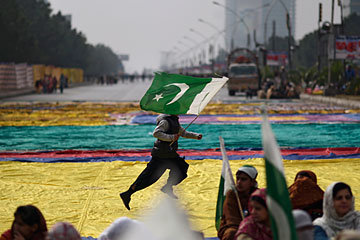
According to a survey, both Shari'a and military rule hold more appeal than democracy for young Pakistanis
If a country's future is determined by its youth, Pakistan's is grim. In a recent survey of Pakistanis aged 18 to 29 (a demographic making up nearly half the population), 94% said the nation was going in the wrong direction. More alarmingly, few had faith in democracy's ability to set things right — ironic, considering that polls on May 11 will see, for the first time in the country's 65-year history, a transfer of power from one democratically elected civilian government to another. According to the British Council's Next Generation Report, only 23% of the 5,271 youths interviewed believe democracy has been good for Pakistan, a stunning condemnation for a country that broke free of nine years of military dictatorship in 2008. But perhaps the antipathy shouldn't be surprising. The Pakistan People's Party-led government that just stepped down may have been the first to complete a full term, but its tenure was marked by inflation, corruption, unemployment and a debilitating energy crisis.
If democracy can't save Pakistan, what will? Thirty-two percent of youths said military rule would be more effective, and 38% thought Shari'a, the style of Islamic law used in Saudi Arabia (and brutally imposed by the Taliban in Afghanistan in the 1990s), was the solution. Only 29% thought democracy was the way forward.
At the root of this is a yearning for effective government — something that democracy has so far failed to deliver. Military rule and Taliban-style justice promise quick fixes, but neither is a viable form of government in the long term. It's difficult to scale up to national level the 7th and 8th century eye-for-an-eye laws of Shari'a, however useful they may be at settling village disputes. The effectiveness of military rule is illusory. Any general can appear decisive when there is no opposition. But juntas inevitably focus on security issues, to the detriment of growth and social development.
The ballot box is the only political tool that offers Pakistan a long-term fighting chance. Unfortunately, many Pakistanis don't see it that way. The only military rule most young Pakistanis have known was that of General, later President, Pervez Musharraf, who overthrew Prime Minister Nawaz Sharif in late 1999. Under Sharif, Pakistan was bedeviled by corruption, inflation and crime. But during Musharraf's time, it was made prosperous — not by his efforts but by the caprice of history. Not long after Musharraf took power, the Sept. 11 attacks on the U.S. fundamentally changed the relationship between Washington and Islamabad. Long-standing sanctions related to Pakistan's development of nuclear weapons, as well as Musharraf's coup, were dropped, and Pakistan became the beneficiary of significant military and financial support. Massive development projects changed the face of its cities, and the Pakistani rupee hovered around 55 to the dollar (it now trades at 98). No wonder young Pakistanis are such fans of military rule.
Similarly, they admire Shari'a because they see it as an upright alternative to the incompetence and malfeasance of secular administrations. In the non-Muslim world, Shari'a has a bad name. The very word suggests Taliban zealots amputating the hands of petty thieves and stoning young adulterers. In Pakistan, however, religious mythmaking propagated in the country's madrassas and mosques equates Shari'a with speedy — and visible — justice. It is a beguiling alternative in a country where the backlog in the courts means that even minor cases can take anywhere from 10 to 18 years to be resolved.
If young Pakistanis are not giving democracy a chance, it's because they haven't seen it do what democracy does best: holding those in power accountable. An incompetent Pakistani government has never been punished at the polls. The military has always stepped in first. But if voters are allowed to effect a change themselves, democracy's standing will rise.
It is unlikely that the next Parliament will be any more effective than the last, since there are few fresh faces running. But when there are new polls five years from now, the lesson of accountability will begin to sink in, both for voters and politicians. Pakistan's youth may be skeptical, but 61% said they were likely to vote next month nonetheless, and 77% thought their generation would make Pakistan a better country. If they begin voting out their inept politicians, then they will.
